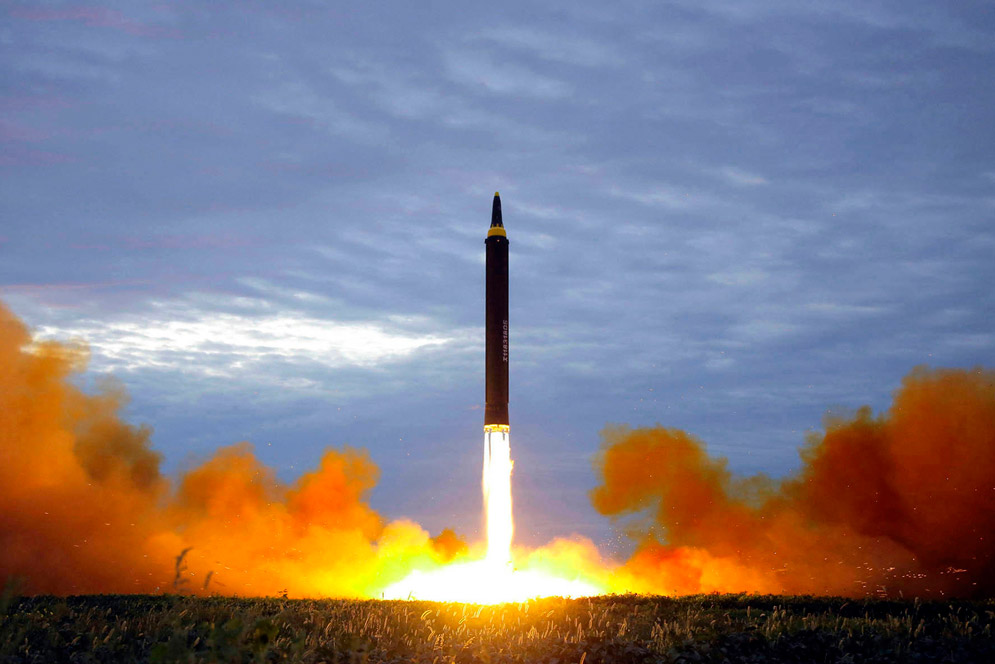Why Terrorists Kill
Class ponders psychology, not ideology, as motive for killings

Media reports focus on terrorists’ stated reasons for their attacks; a BU class is studying their possible unstated motivation. Photo courtesy of Flickr contributor Cliff1066
Class by class, lecture by lecture, question asked by question answered, an education is built. This is one of a series of visits to one class, on one day, in search of those building blocks at BU.
Just three months after a BU peer died in the Boston Marathon bombings, 18 students are spending the living-is-easy summer pondering a grim topic—why terrorists kill—and whether the answers we think we know are all wrong.
To wit: the 9/11 hijackers did not board those planes out of devotion to militant Islam. If Dzhokhar Tsarnaev helped bomb the Marathon—he pleaded not guilty at his July arraignment—it wasn’t to avenge Muslims killed by US wars, the rationale Tsarnaev allegedly scrawled on the boat where cops cornered him. For that matter, Russian socialist terrorists early in the 20th century didn’t kill for socialism, and a fight for land isn’t really the animus behind Palestinian attacks on Israel.
“Post-factum, they justify their acts by saying what they say. But those justifications are such clichés,” Anna Geifman, a College of Arts & Sciences history professor emerita, told the students gathered in a fifth-floor seminar room for her Issues in Modern Terrorism class. The ideological inspirations terrorists cite don’t hold up under scrutiny, Geifman contended; from Marxism to Islam, none endorses wanton slaughter. To find the real motive, she said, requires tromping through these killers’ subconscious psychology.
From the dawn of modern terrorism, which Geifman traces to early 20th-century Russia, through today’s jihadists, terrorists have shared a “dark form of fascination with destruction and killing,” a “death worship” transcending ideology, she told her students. People who become terrorists typically are “dislocated individuals who had left their traditional culture and severed their ties partly with their traditional environment,” their sense of identity sundered between their old and adopted cultures. She believes Dzhokhar Tsarnaev, who moved to Cambridge, Mass., from Dagestan when he was just eight, fits this psychological-misfit profile to a T, even as Cantabrigians scratch their heads over their welcoming community producing alleged killers in Dzhokar and his brother Tamerlan.
Geifman includes on the syllabus her own book Death Orders: The Vanguard of Modern Terrorism in Revolutionary Russia (Praeger, 2010), which tries to enter terrorists’ minds via the highway of psychiatric and psychological research. “Psychologists tell us…that up to 90 percent of what we do and how we decide things and our motivations are subconscious,” she said in an interview. Combined with a craving for attention—“Each terrorist act is like a letter, and it’s a letter addressed to us,” she told students—this psychology leads to murder, in her view.
Around an octagonal cluster of tables with leafy Bay State Road below, such horrors seemed distant, the toughest ordeal facing these students being the challenge of a three-hour class that starts at 6 p.m. Yet Wang Sun (MET’14) got hooked and waded into this swamp of subconscious impulses and conflicts. What benefits do today’s jihadist attacks on Americans reap, he asked, when they only create public panic that gives “the government an excuse to send more military into the region?”
“I feel like their purpose was to create that panic,” another student retorted. “You don’t think we’re still changed” after 9/11?
“Before you ask how it benefits them, you should ask, what do they want?” Geifman chimed in. That question requires psychological probing, she said, whether terrorists actually benefit or not from their violence.
Geifman assured her listeners that they wouldn’t imperil their grade by disagreeing with her. Indeed, she readily submits herself to psychology’s lens. “As a citizen and as a Jewish person, I’m obviously very biased,” she said, recounting how she’s known victims of terrorism and once worked in an Israeli city where “we were under continuous shelling every day, several times a day.” In the interview, she demonstrated her opinionated side by declaring that the 1946 bombing of the King David Hotel by Zionist militants was not terrorism, since the targets were British soldiers. (Others, from writers at the New York Times to the BBC, disagree.)
Russian-born Geifman (CAS’84, GRS’85) immigrated to the United States at age 14. (Authorities in what was then the Soviet Union mistakenly let her Jewish family out of the country, she said.) She taught at BU for two decades before moving to Israel. She split her time teaching in both countries until joining Israel’s Bar-Ilan University full-time and reserving her BU terrorism class for summers. Still the peripatetic professor, she landed in Boston the morning of her first class and plans to fly home the day it ends.
Arguing for an enduring psychology of terrorism, her book includes a historical artifact: almost a century before 9/11, Russian terrorists considered the possibility of flying a primitive plane into the imperial Winter Palace in St. Petersburg.
“Approximately 3,000 people would have been killed,” she told her class, roughly the 9/11 death toll. As an academic Cassandra, she suffered that Greek seer’s fate of glimpsing an ugly future before everyone else: Geifman recalled how she stopped for coffee en route to work at BU on September 11, 2001, and saw patrons staring at TV news about the attacks.
“My first reaction was, they finally did it.”
This Series
Also in
One Class, One Day
-
November 30, 2018
Breaking Bad Director Gives CAS Class the Inside Dope
-
October 31, 2018
Trump and the Press: We’ve Been Here Before
-
August 3, 2018
A Scholarly Take on Superheroes

Comments & Discussion
Boston University moderates comments to facilitate an informed, substantive, civil conversation. Abusive, profane, self-promotional, misleading, incoherent or off-topic comments will be rejected. Moderators are staffed during regular business hours (EST) and can only accept comments written in English. Statistics or facts must include a citation or a link to the citation.